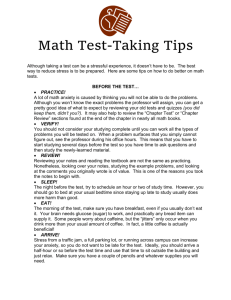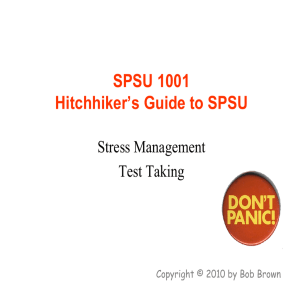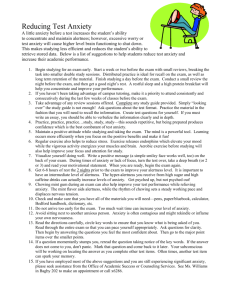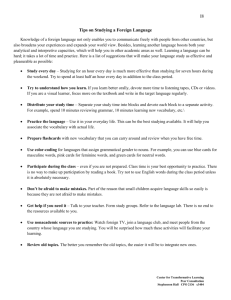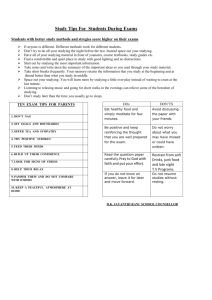AOA Step 1 Preparation Guide
advertisement
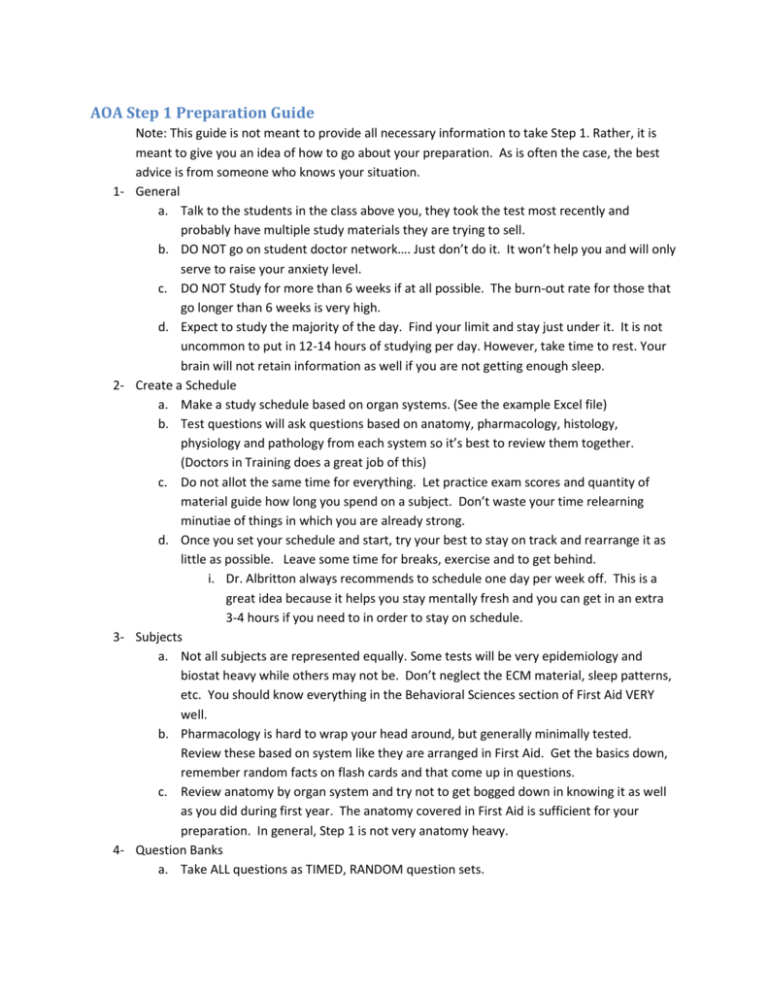
AOA Step 1 Preparation Guide 1- 2- 3- 4- Note: This guide is not meant to provide all necessary information to take Step 1. Rather, it is meant to give you an idea of how to go about your preparation. As is often the case, the best advice is from someone who knows your situation. General a. Talk to the students in the class above you, they took the test most recently and probably have multiple study materials they are trying to sell. b. DO NOT go on student doctor network…. Just don’t do it. It won’t help you and will only serve to raise your anxiety level. c. DO NOT Study for more than 6 weeks if at all possible. The burn-out rate for those that go longer than 6 weeks is very high. d. Expect to study the majority of the day. Find your limit and stay just under it. It is not uncommon to put in 12-14 hours of studying per day. However, take time to rest. Your brain will not retain information as well if you are not getting enough sleep. Create a Schedule a. Make a study schedule based on organ systems. (See the example Excel file) b. Test questions will ask questions based on anatomy, pharmacology, histology, physiology and pathology from each system so it’s best to review them together. (Doctors in Training does a great job of this) c. Do not allot the same time for everything. Let practice exam scores and quantity of material guide how long you spend on a subject. Don’t waste your time relearning minutiae of things in which you are already strong. d. Once you set your schedule and start, try your best to stay on track and rearrange it as little as possible. Leave some time for breaks, exercise and to get behind. i. Dr. Albritton always recommends to schedule one day per week off. This is a great idea because it helps you stay mentally fresh and you can get in an extra 3-4 hours if you need to in order to stay on schedule. Subjects a. Not all subjects are represented equally. Some tests will be very epidemiology and biostat heavy while others may not be. Don’t neglect the ECM material, sleep patterns, etc. You should know everything in the Behavioral Sciences section of First Aid VERY well. b. Pharmacology is hard to wrap your head around, but generally minimally tested. Review these based on system like they are arranged in First Aid. Get the basics down, remember random facts on flash cards and that come up in questions. c. Review anatomy by organ system and try not to get bogged down in knowing it as well as you did during first year. The anatomy covered in First Aid is sufficient for your preparation. In general, Step 1 is not very anatomy heavy. Question Banks a. Take ALL questions as TIMED, RANDOM question sets. i. Focusing on what you are studying at the time may seem like a good idea but when you review microbiology in week one and take all the questions at the same time, you won’t remember it five weeks later. b. Initially, use questions as a break from studying. Study for an hour or two then do a question block to mix it up. i. Figure out how many total UWorld questions there are and find out how many you have to do each day to get through them. Incorporate this into your daily schedule. (See the example schedule Excel file) ii. Because you’ve incorporated questions into your schedule, you should get through them all. If you don’t, it is okay but try to not let that happen. c. DO NOT use questions as your only means of studying. They are a supplement and help you learn HOW to take the test (i.e. improve reading speed, question navigation). They are not a substitute. d. Practice tests are best taken half to three-quarters of the way through studying and again one week before test day. i. Resist the urge to take a practice test right before your real thing as this will inevitably cause unneeded anxiety. If you really want to know where you stand, there are UWorld test scores converters that approximate your to Step 1 score fairly well. e. Stamina and anxiety control are key to doing well on Step 1. This is why ALL questions should be TIMED and RANDOM. f. For practice tests, find a quiet, private area where you can simulate the real thing. They are another way to build stamina and control you anxiety levels. Have a plan for how you will take your breaks and give it a trial run. Most people have anxiety after the first block, so a break after the first block may be helpful. At most, take the first 3 sections then use your break time more regularly after the subsequent sections. If you feel you need to change the break schedule, it’s best to learn that beforehand and not on test day. 5- Scheduling a. If you really need to test on a particular day, schedule your test in North Augusta or Atlanta. MCG doesn’t open test days until after the other sites, so you may have to be less picky on the exact date if you want to test there. Don’t freak out on the day when everyone in the library is trying to sign in at the same time. 6- Study materials a. It is very easy to go out and buy way too many books. Start off small with First Aid as your core text. At most, supplement each subject with one book and then maybe some flash cards. You can always buy more, but don’t spend too much money at the start. Use Amazon and the class above you to save some money. 7- Final Review a. Arrange your schedule so that you review all systems with one week to review. Go through First Aid one last time during that last week and create a sheet of things you want to write down on your scratch sheet for the real test. (The example schedule Excel file will give you an idea of how to do this). 8- Test Day a. You have to trust your work and rely on your practice tests to let you know where you stand. It is not uncommon to have a pre-test “freak out” when you realize you can’t write down every enzyme and intermediate in every biochemistry pathway. Relax and remember that you’ve done nothing but study for 6 weeks. If you’re not going to do well, then who is? b. There will be questions on the test that will make you think “What in the world are they talking about?” When this happens, take a guess and move on. Don’t give those questions another thought and focus on getting the ones right that you do know. Remember, everyone else has those types of questions as well. 9- Celebration a. After the test, go celebrate all of your hard work. If you have put in the work, you will leave the testing center knowing that you did your absolute best. You’ll know there was nothing else you could have fit into your 6 weeks that would have helped. If you can say that, you’ve succeeded. Alpha Omega Alpha Honor Medical Society Alpha of Georgia Chapter Class of 2012 Medical College of Georgia at GHSU
